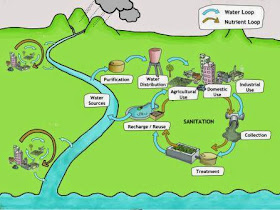The movie brings the Issues of Farmers and Agriculture in India to the audience (public). The
movie with the heroic approach has action, romance, sentiment etc. If we look in to it leaving behind the
controversies surrounding the producer or political aspiration of the hero, it is trying to unfold the problems deteriorating the status of agriculture in
India.
In
2012, the National Crime Records Bureau of India reported 13,754 farmer
suicides. The movie mock at the negligence of the Media, Bureaucrats or even
the public outside the Agriculture.
A farmer never suicide for the loss of livelihood,
he do so only when he lose his self-respect.
This movie illustrates
the farmer suicide as a tool to receive media attention. The consecutive murders
of farm-land owner to serve the corporate interest also give an insight on the
selfish desire of the modern literate.
The
Mass Media either be print or visual remains to be a business firm rather than
being a responsible 4th pillar of the democracy. The movie mock the
Media by exposing their striving attitude towards Hot News line like Rape,
Riot, Infidelity, etc. The technological advancement brings the world in the
box, which has been made possible by the Media. But now a day it became an
Entertainment industry leaving behind their audacity towards social injustice. The
media should have Social responsibility beyond their business interest. When
the checks and balance of the Legislative-Executive-Judiciary framework fails, Media
is the only remedy. It is the voice of the people. It educates the uneducated.
The media should consider rural journalism and Agri-Journalism.
The
Integrity of the responsible bureaucrats is questioned in the incidence of such
derogation of life line and dignity of the farmers. The products made by man
can be given the price tag but not the morality, ethics, dignity and self-respect.
The reluctance of bureaucrats towards the downtrodden reminds us the Gandhiji’s
Talisman.
The lack of political will put the Farmer in the agony
and it degrades the status of Agriculture. The law makers should abjure from pro-corporate strategy at the cost of poor in turn it would result in Anti-Agricultural policies. Many existing and pending policies directly or
indirectly affecting the agriculture, such as
1.
Land Acquisition
for Non-Farm purpose.
2.
Promotion GM
Crops and Field Trails for BT
3.
National Water
Policy might deprive their basic source for Agriculture.
But the movie failed to explain some essential things,
Before
pointing at others… Need of the hour is to think… “What we have done?”
First
know the Sources and secrete of water?
What
is our concern to preserve it?
What should be done...
Rain water harvesting, renovation
of pond, recycling Sewage from industries and domestic outlet before entering
the stream …
Are we doing any of the following??
Dr. Nammazhvar suggest
for root top water storage (as the ground has been sufficiently polluted, it
will be clever only if we can catch the water directly from the sky), adequate
space much be provided for the rain water to percolate in to the ground…
If we fail to realize all these at this helm,
then
the tarred road is ready for us
to march towards our graves.
What
is Sustainable Agriculture?
Impact of GM, BT crops…
Why Agriculture depends on the Chemical Fertilizers (NPK)… a small question in
the movie little thought provoking… When did you plant a tree last time?
Are we…
The farm lands demand the waste back from the human. But
the rapid urbanization hinders the cycle.
The farm produce are consumed by the urban cities but the waste are either
dumped in to unwanted yards or outpoured in to river streams.
Agriculture is the umbilical cord of our country. It is a culture. It is the life line. It can never be perceived to be a business either it can compete with it. It is the duty of every individual and the people in power to respect the farmers and their service through Agriculture. When a time, makes a country to depend the other for food, then it is the end to the vision of our Great Leaders and Ancestors. The country producing Arms & Ammunition can never rule the world; it’s possible only by the country which can feed the world.
Further
reading on Status of Agriculture in India:
a.
The article
discuss about August 2003, launch of ‘break bottle’ campaign by SP & BJP.
b.
It also mentions
that soft drink contains lethal pesticide and its ban by parliament canteen
following Delhi based CSE report.
a.
Continuing
Agrarian crisis due to excessive spending on the Agro-Input in the form of HYV,
Pesticide, fertilizers…
a.
The UN report
2007, list down increased usage of chemical fertilizers cause the soil
infertile, three years of drought led to zero yield as the reason for farmers
distress in India.
b.
It also gives
the figure that about 200 farmers committed suicide between July 2005 to Feb
2006, there were almost 2 suicides a day in this eight month period.
5.
Sustainable
Agriculture Initiatives
6.
Water Management – Case studies in India
i.
Poptrao Pawar –
Hiware Bazar – Watershed Programme – Based on Anna Hazare’s Ralegan siddhi
Model.










No comments:
Post a Comment